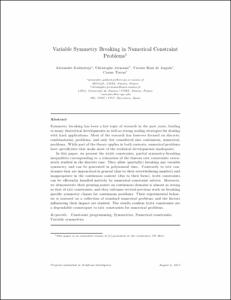Mostra el registre d'ítem simple
Variable symmetry breaking in numerical constraint problems
| dc.contributor.author | Goldsztejn, Alexandre |
| dc.contributor.author | Jermann, Christophe |
| dc.contributor.author | Ruiz de Angulo García, Vicente |
| dc.contributor.author | Torras, Carme |
| dc.contributor.other | Institut de Robòtica i Informàtica Industrial |
| dc.date.accessioned | 2016-03-29T17:56:04Z |
| dc.date.available | 2017-12-01T01:30:17Z |
| dc.date.issued | 2015 |
| dc.identifier.citation | Goldsztejn, A., Jermann, C., Ruiz De Angulo, V., Torras, C. Variable symmetry breaking in numerical constraint problems. "Artificial intelligence", 2015, vol. 229, p. 105-125. |
| dc.identifier.issn | 0004-3702 |
| dc.identifier.uri | http://hdl.handle.net/2117/84830 |
| dc.description.abstract | Symmetry breaking has been a hot topic of research in the past years, leading to many theoretical developments as well as strong scaling strategies for dealing with hard applications. Most of the research has however focused on discrete, combinatorial, problems, and only few considered also continuous, numerical, problems. While part of the theory applies in both contexts, numerical problems have specificities that make most of the technical developments inadequate. In this paper, we present the rlex constraints, partial symmetry-breaking inequalities corresponding to a relaxation of the famous lex constraints extensively studied in the discrete case. They allow (partially) breaking any variable symmetry and can be generated in polynomial time. Contrarily to lex constraints that are impractical in general (due to their overwhelming number) and inappropriate in the continuous context (due to their form), rlex constraints can be efficiently handled natively by numerical constraint solvers. Moreover, we demonstrate their pruning power on continuous domains is almost as strong as that of lex constraints, and they subsume several previous work on breaking specific symmetry classes for continuous problems. Their experimental behavior is assessed on a collection of standard numerical problems and the factors influencing their impact are studied. The results confirm rlex constraints are a dependable counterpart to lex constraints for numerical problems. |
| dc.format.extent | 21 p. |
| dc.language.iso | eng |
| dc.rights.uri | http://creativecommons.org/licenses/by-nc-nd/3.0/es/ |
| dc.subject | Àrees temàtiques de la UPC::Informàtica::Robòtica |
| dc.subject.other | artificial intelligence |
| dc.subject.other | mathematical programming |
| dc.subject.other | symmetry |
| dc.subject.other | constraint programing |
| dc.subject.other | numerical constraint satisfaction problems |
| dc.subject.other | constraint satisfaction problems |
| dc.subject.other | symmetry breaking |
| dc.subject.other | variable symmetry breaking |
| dc.title | Variable symmetry breaking in numerical constraint problems |
| dc.type | Article |
| dc.contributor.group | Universitat Politècnica de Catalunya. KRD - Cinemàtica i Disseny de Robots |
| dc.contributor.group | Universitat Politècnica de Catalunya. ROBiri - Grup de Robòtica de l'IRI |
| dc.identifier.doi | 10.1016/j.artint.2015.08.006 |
| dc.description.peerreviewed | Peer Reviewed |
| dc.subject.inspec | Classificació INSPEC::Cybernetics::Artificial intelligence |
| dc.relation.publisherversion | http://www.sciencedirect.com/science/article/pii/S0004370215001216 |
| dc.rights.access | Open Access |
| local.identifier.drac | 17087748 |
| dc.description.version | Postprint (author's final draft) |
| local.citation.author | Goldsztejn, A.; Jermann, C.; Ruiz De Angulo, V.; Torras, C. |
| local.citation.publicationName | Artificial intelligence |
| local.citation.volume | 229 |
| local.citation.startingPage | 105 |
| local.citation.endingPage | 125 |
Fitxers d'aquest items
Aquest ítem apareix a les col·leccions següents
-
Articles de revista [163]
-
Articles de revista [376]
-
Articles de revista [25]


